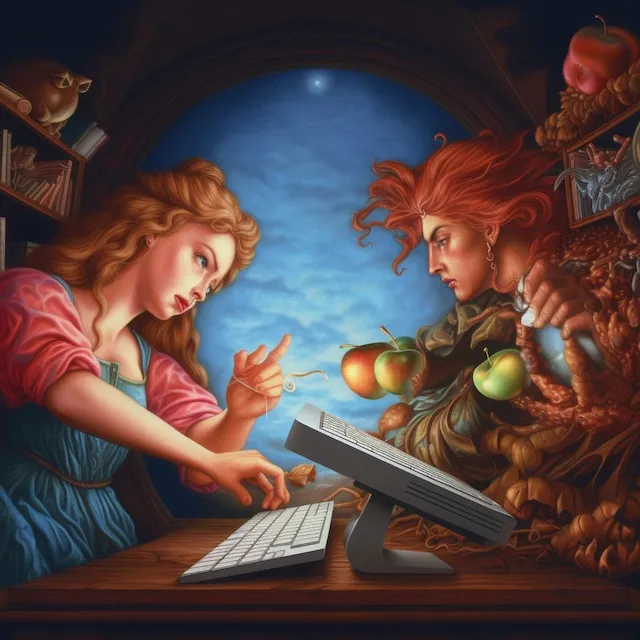A GPTian Feud: The Intellectual Joust of Property and AI

In a world where rapid technological advancements are reshaping economies and societies, artificial intelligence (AI) has become the knight in shining armor, hailed for its potential to solve intractable problems and streamline processes. As the algorithmic crusades reach their zenith, the greatest champions of this age - Generalized Pre-trained Transformers (GPTs) - are facing their own digital Waterloo. This time, the battle is not between humans and machines, but rather between the concept of intellectual property and the very nature of AI.
The issue at hand is the lawsuits filed against companies like Stability, OpenAI, and Microsoft, all of whom have harnessed the power of GPTs by training their models on data sourced from the internet. By doing so, they have unwittingly wandered into the murky waters of intellectual property rights. The digital paladins are accused of misappropriating copyrighted material, giving rise to a clash that could have far-reaching implications for the future of AI.
One such lawsuit is the Getty Images v. Stability case, which claims that Stability’s AI model, Stable Diffusion, infringes on Getty Images’ copyrighted material by generating images based on their copyrighted works. Stability is accused of knowingly generating images containing distorted versions of Getty Images’ watermark, and of not modifying its model to prevent this from happening.
Another prominent case is the lawsuit filed against Microsoft, GitHub, and OpenAI. The complaint alleges that GitHub’s AI-powered Copilot tool, which leverages OpenAI’s technology, relies on “software piracy on an unprecedented scale” by scraping licensed code without permission. The companies have asked the court to dismiss the lawsuit, asserting that the claims don’t hold up and that the plaintiffs rely on “hypothetical events” to make their claim, without describing how they were personally harmed by the tool.
The quest for pre-eminence in AI has led to the development of ever more powerful models, capable of generating human-like text, making complex predictions, and even creating art. OpenAI, the creator of GPT-3 and GPT-4, has been a key player in this digital arms race, achieving a level of sophistication that has both captivated and alarmed observers. These technological marvels are trained on vast amounts of data, encompassing everything from literary classics to banal tweets, which are then synthesized to produce new content or respond to user prompts.
It is precisely this modus operandi that has become the Achilles’ heel of GPTs. By ingesting copyrighted works, the question arises as to whether the resultant AI-generated content constitutes an infringement of intellectual property rights. The plaintiffs argue that companies like Stability, OpenAI, and Microsoft have, in effect, built their digital empires on the foundations of others’ creativity, without consent or recompense.
The defendants, for their part, assert that AI-generated content is a transformative use of the original works, akin to fair use, and therefore not subject to the same strictures as traditional copyright infringement. Moreover, they contend that the sheer scale and complexity of the data used in the training process render any individual work a mere drop in the ocean of knowledge, too diluted to be considered a substantial copy.
As the legal joust unfolds, the ramifications are sure to reverberate throughout the realm of AI. A victory for the plaintiffs could herald a new era of stringent copyright regulations, potentially stifling innovation and hindering the development of future GPTs. On the other hand, a triumph for the defendants might signal a paradigm shift in our understanding of intellectual property and its role in the age of AI.
Whatever the outcome, the digital landscape will be forever changed. As the GPTs stand on the precipice of a legal maelstrom, the rest of the world must grapple with the broader implications of this clash of titans. Will the concept of intellectual property adapt to accommodate the new technological realities, or will the AI juggernaut be forced to tread more cautiously in the face of old-world constraints? Only time will tell, but one thing is certain: the GPTian feud is far from over.
As the legal battles against Microsoft, GitHub, OpenAI, and Stability continue, the tech industry will be closely monitoring the outcomes. The decisions made in these cases will not only affect the companies involved but also set precedents for future AI-related disputes. The way in which intellectual property law evolves to address the challenges posed by AI-generated content will be critical for the progress and innovation in the AI field.
At the heart of these disputes lies a fundamental question about the nature of creativity and ownership in the digital age. The emergence of AI-generated content challenges our traditional notions of authorship, blurring the lines between human and machine creativity. As we continue to explore the potential of GPTs and other AI technologies, society must confront these complex questions and develop new frameworks to balance the rights of creators with the need for innovation.
In the meantime, the GPTian feud serves as a reminder of the challenges that come with rapid technological progress. As AI continues to transform the world around us, we must remain vigilant in addressing the ethical and legal dilemmas that arise in its wake. Only then can we fully harness the potential of these digital knights, ensuring a more prosperous and equitable future for all.